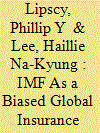| Srl | Item |
| 1 |
ID:
165158


|
|
|
|
|
| Summary/Abstract |
A large literature has established that the International Monetary Fund (IMF) is heavily politicized. We argue that this politicization has important consequences for international reserve accumulation and financial crises. The IMF generates moral hazard asymmetrically, reducing the expected costs of risky lending and policies for states that are politically influential vis-à-vis the institution. Using a panel data set covering 1980 to 2010, we show that proxies for political influence over the IMF are associated with outcomes indicative of moral hazard: lower international reserves and more frequent financial crises. We support our causal claims by applying the synthetic control method to Taiwan, which was expelled from the IMF in 1980. Consistent with our predictions, Taiwan's expulsion led to a sharp increase in precautionary international reserves and exceptionally conservative financial policies.
|
|
|
|
|
|
|
|
|
|
|
|
|
|
|
|
| 2 |
ID:
165172


|
|
|
| 3 |
ID:
186597


|
|
|
|
|
| Summary/Abstract |
What determines public support for trade liberalization? Scholars of international political economy have generally focused on the effects of openness on employment via individuals’ skill level, sector, or occupation. Recent developments in trade economics suggest that the characteristics of individual citizens’ employing firms may also shape their attitudes on trade policy. In this paper, using under-explored survey data combining trade opinion with measures of employer productivity (from the 2008 Japanese General Social Survey), we present evidence that employees of more productive, more globalized firms are much more supportive of trade openness than employees of less productive, domestically oriented firms, even when accounting for skill level and sectoral and occupational characteristics. Moreover, we find evidence that the effects of these characteristics described in the literature are conditioned by globalized firm employment. Last, we find that the effect of globalized firm employment is conditioned by employees’ relative position within their firms. Those who are more likely to benefit directly from firm success—such as permanent employees and managers—hold the most pro-trade preferences. These findings suggest that economic interests affect individual policy preferences in more nuanced ways than previously recognized.
|
|
|
|
|
|
|
|
|
|
|
|
|
|
|
|